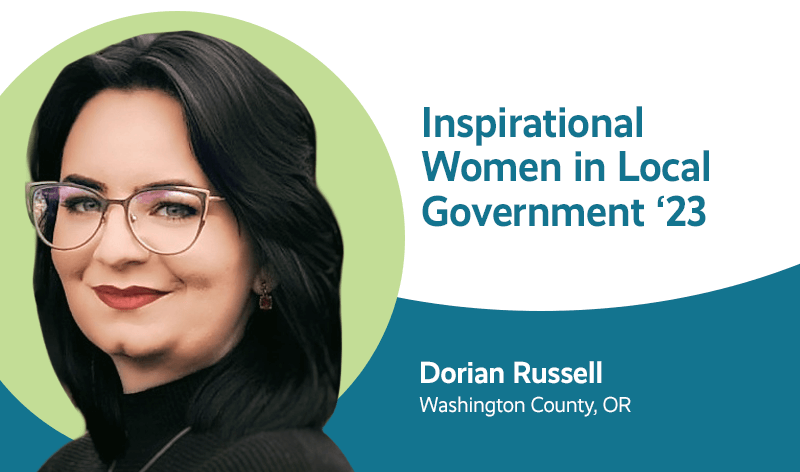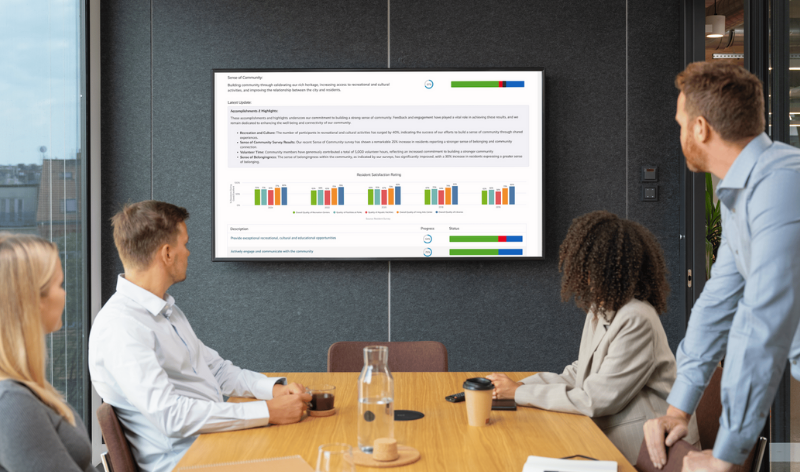Summary
Dorian Russell, ARPA Program Manager for Washington County, Oregon, shares a powerful perspective on leadership, equity, and systemic reform in local government, highlighting how real progress comes from dismantling structural bias, strengthening accountability, and centering lived experience rather than asking marginalized people to adapt to broken systems.
Key Takeaways
- Workplace equity requires structural change, not individual behavioural correction.
- Inclusive leadership is driven by transparency, intersectionality, and allyship.
- Sustainable public-sector progress depends on accountable systems and community-centered policy.
Every year, we celebrate some of the inspirational women we work with in public service who are driving positive change in their organizations by championing greater organizational trust and transparency, higher performance, and better service for their communities.
This year, as we think about the 2023 International Women’s Day thematic call to “Embrace Equity”, we are also reflecting on the need for continued education.
So, as we highlight and showcase these inspirational women, we’ve also asked them to do the difficult thing of sharing some of their own experiences of gender bias in the workplace.
We’ll be sharing the stories of four wonderful women throughout this week. As always, we hope to celebrate, inspire, and educate by sharing some of their wisdom.
Today, we’re talking with Dorian Russell, American Rescue Plan Act (ARPA) Program Manager at Washington County, Oregon. (You can connect with Dorian here.)
Dorian, what are you reading right now?
A more wintry-than-usual March for our region has me pining for spring, so I just picked up a field guide to wildflowers at my local Friends of the Library sale. While I am usually a social analysis junkie (in recent months, I’ve enjoyed How Civil Wars Start and How to Stop Them by Barbara Walter and Dark Money: The Hidden History of Billionaires Behind the Rise of the Radical Right by Jane Mayer), I needed a gentle reprieve to stop and – read – the flowers.
Tell me a little about your community, your role, and how you got here.
I am from, live in, and work for Washington County, Oregon. Washington County makes up a part of the Portland metro area, and includes a lively combination of urban, suburban, and rural communities. We get to experience the arts and culture opportunity of a city, quaint main streets, and breathtaking slopes of forests and farmland! I serve as the American Rescue Plan Act (ARPA) Program Manager for the County – a long title meaning I manage federal pandemic aid for a local government. I have the honor of working with our elected body on policy direction and with staff from a diversity of disciplines in implementation. This includes $117M in 40+ programs across public health, economic recovery, and community engagement.
What’s one of the best pieces of advice you have received in your career? Why?
The best advice I have received is not to internalize bad advice. By “bad” advice, I mean any guidance – no matter how well-intentioned – that targets individuals instead of systemic problems. Some examples based on gender: Telling women they ought to learn how to play golf in order to have men see them as peers. Suggesting that women ought to “lean in” to be seen and heard. Policing ways of dress or appearance to conform with outmoded standards. Each of these types of advice intend to address the problem of disparity in the workplace, but instead of targeting issues in policy or practice, they seek to “fix” women rather than sexism (and, we do not need fixing, thank you very much!). This kind of advice restricts our abilities to fully and authentically lead as ourselves – and for me personally, it adds to my mental fatigue and sense of isolation. Instead, spreading advice that serves us all collectively by advocating for policy change is far more uplifting, especially when it’s grounded in intersectionality (considering race, sexuality, disability status, and other factors simultaneously).
What are you most proud of professionally?
In my current job, I am most proud that the programs I have played a role in implementing have saved lives, prevented evictions, put food on folks’ tables, and kept small businesses afloat. Working for a local government that includes the public health authority during a global pandemic is something I will still have stories about when I am 90 years old.
The theme for this year’s International Women’s Week is “embrace equity”. We can’t embrace equity without education. Are you able to share a story of a time when you have experienced gender bias or microaggressions in the workplace?
I am a young queer woman with a disability from a low-income background – do I experience bias? Is water wet? Is the sky blue? Yes. Every day. Both in my public policy and scientific career, I have experienced a range of unwanted interactions from microaggressions to harassment to compromised safety. Instead of detailing these experiences and triggering readers with shared experiences, I’ll share my central reflection: too often the policies in place for addressing unwanted conduct at work are inadequate (or practices are poorly followed). Beyond observing International Women’s Week on social media, employers must improve the accessibility, efficiency, and accountability of their civil-rights-related structures to truly advance equity. In the meantime, I’m handling unwanted interactions by being exceptionally direct (“Stop, that comment is hurtful,” or “Explain to me why that joke is appropriate,”) naming problems by name (“You’ve interrupted her three times. Please let her finish.”) and calling on allies to do the labor of education and culture change with and without me there.
What are your top places to go for support, education, or mentorship in your role?
For support, I would not survive without other marginalized people and the safe spaces we forge together – while often informal, the power of just a few strategic-minded folks at a happy hour is not to be underestimated! When it comes to mentorship, I have found it important to seek mentors with just about nothing in common as well as those with shared identities – it matters for perspective, learning, and networking.
Are there other amazing women you know in public service that deserve a shout-out? Celebrate them here!
I’d like to give a shout out to: Erika Lopez at the City of Portland, Oregon. In addition to her impactful work in removing barriers in the City’s permitting process, Erika also serves on the Hillsboro School Board and is Vice President of the Oregon School Boards Association. She was also nationally selected to participate in the Local Government 2030 convening. You are an icon, Erika!



